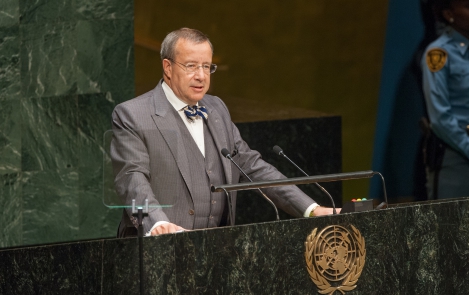-
Reset
+

President Ilves at the UN: the cultural heritage of indigenous peoples is a form of wealth that clearly outweighs the economic profit gained by the extensive and unsustainable exploitation of natural resources
23.09.2014
"We are obliged to do everything we can to support indigenous peoples; to respect their past and to grant them their future. Indigenous peoples, no matter if they live in the Leningrad Oblast, Crimea, the Amazonas, New Zealand, Arizona or the Scandinavian peninsula, they must all be fully acknowledged," told the President, Toomas Hendrik Ilves, in New York, at the high-level plenary meeting of the World Conference on Indigenous Peoples, which took place, for the first time, during the general discussion forum of the 69th General Assembly of the United Nations.
In his address, President Ilves listed factors that have left deep wounds within many indigenous populations: urbanisation, industrialisation, world wars, deportations and extensive migration.
He emphasised, repeatedly, that the rights of indigenous people are to be respected and still admitted: material gains are often prioritised over fundamental rights.
"It is crucial to understand that the cultural heritage of indigenous peoples is a form of wealth that clearly outweighs the economic profit gained by extensive and unsustainable exploitation of natural resources. This reckless pursuit of profit at the expense of peoples' culture is precisely what we have witnessed in many Finno-Ugric areas," told the Estonian Head of State.
"For Estonians, the future of Finno-Ugric peoples with whom we are linked in kinship and language is particularly close to our hearts. We know and have felt the fear of extinction," he added.
President Ilves commented that the Votic population, our Finno-Ugric cousins, are also among the threatened indigenous people, referring to the construction of the large Laugasuu (Ust-Luga) port, which began a few years before the turn of the millennium. It is being built on traditional Votic lands where our cousins have lived for as long on their territory as we Estonians on ours. This construction poses a great danger to the last three remaining Votic villages: Luutsa, Liivtšülä and Jõgõperä.
"The construction of Laugasuu port is in conflict with the UN Declaration on the Rights of Indigenous Peoples. We all know there is a long list of indigenous peoples living in the most challenging of conditions. For example, side by side with the Votes lives another small Finno-Ugric nation, the Izhorians, who are especially endangered by the plan to erect a chemical plant right next to their villages of Rutši and Viistina. If the chemical plant is erected and the environment destroyed, the nation and culture would be endangered and might be even destroyed. And mankind will grow ever poorer," warned the Estonian Head of State.
This is the first global congress on indigenous people. In 2007, a declaration about the rights of indigenous peoples was adopted at the general forum week of the UN General Assembly. Negotiations held to prepare the declaration lasted for over twenty years, and involved various countries and indigenous peoples. The declaration represents an agreement approved by the UN that covers a variety of issues, involving indigenous populations, and it is aimed at promoting the rights of indigenous peoples and supporting their development. The declaration focuses on the preservation and promotion of culture, traditions and institutions of indigenous peoples, the rights of indigenous populations with respect to land and natural resources, and their participation in the adoption of related decisions.
Estonia supports the development of the indigenous populations of the world via the UN, and it offers practical assistance and contributes to the funds of the UN that are aimed at promoting the development of indigenous people and the Permanent Forum of Indigenous Issues; an expert of Finno-Ugric issues, Oliver Loode, is also one of the members of the forum.
The text of the address by the President, Toomas Hendrik Ilves, is available here.
The text of the Declaration of the Indigenous People is available in Estonian at the following link: http://vm.ee/sites/default/files/content-editors/web-static/298/Polisrahvaste_deklaratsioon_EST.pdf
Additional information about the World Conference on Indigenous People is available in English from this link: http://www.un.org/en/ga/69/meetings/indigenous/#&panel1-1
Office of the President
Public Relations Department
Phone +372 631 6229


